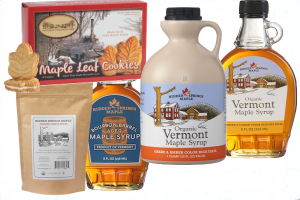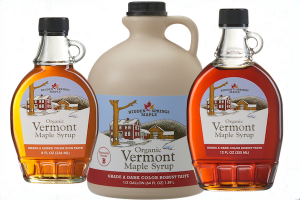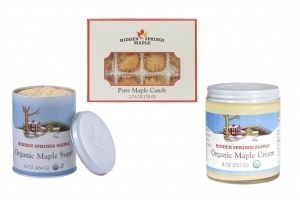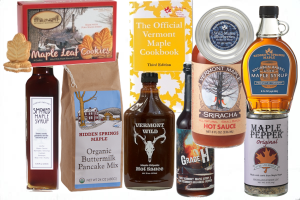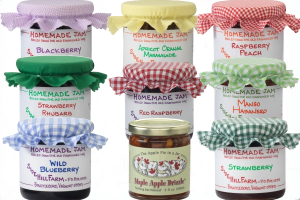Support Vermont Maple Farms
Farming is a way of life in Vermont. Over the past several decades Vermont has seen a dramatic shift from dairy farming to maple sugaring. Maple syrup is now the single largest agricultural product from Vermont. We are deeply committed to supporting farming as a way of life and the family maple farms in Vermont.
Hidden Springs Maple is both a producer of maple syrup and a packager (packer) of maple syrup. We have worked to establish a national market for Vermont maple syrup direct from the farm.
Because we now market more maple syrup than we produce, we purchase bulk maple syrup from a number of our close neighbors in Vermont. This provides our neighbors farms with access to the national market for Vermont maple syrup market and a reliable source of income.
Commitment to Sustainable Forestry
As the focus in Vermont has shifted from diary to maple syrup, many of the pastures that were productive sheep farms in the 1800s have grown up and are now productive sugar bushes. Integration of the sugar bush with the primary hardwood forests is now an important concern for Vermont farmers. The organic certification process is one way that Vermont maple producers can ensure that their maple sugar bushes are managed in a sustainable way.
The National Organic Standards treat maple syrup as a “wild crop.” The standards state that “a wild crop must be harvested in a manner that ensures that such harvesting or gathering will not be destructive to the environment and will sustain the growth and production of the wild crop.”
All of our sugar bushes as well as our producers’ sugar bushes are managed for long-term sustainable production including tree health and long-term preservations of the forest ecosystem. VOF provides specific guidelines for minimum tree size and number of taps per tree. We only tap mature maple trees which are 30 to 40 years of age and at least 12 inches in diameter.
Bird Friendly Forestry and Maple production
We are committed to promoting bird-friendly habitat in sugar bushes in Vermont. In cooperation with Vermont Audubon, we are participating in an initiative promoting bird friendly syrup.
When the CE maple bush was hard hit by the forest tent caterpillar invasion a number of years ago, we noticed the presence of an unusual number of cuckoos. We eventually learned that the cuckoos were there to eat the forest caterpillars. This led us directly to an appreciation of the importance of a balanced approach to forestry management.
Vermont sugar bushes are now threatened by the spread of Asian long-horned beetles which have now reached the Southern borders of Vermont. A variety of Woodpeckers have been found to eat these beetles. Therefore, providing forest habitat for the woodpeckers is another important priority for balanced forestry and sugar bush management.
Today we manage our sugar bush as a healthy, diverse and functioning forest system. This has resulted in forest management practices including:
- Selective cutting to promote a diversity of tree species. Rention of Soft woods are especially desirable. By maintaining a diverse tree population we discourage the rapid spread of insect invasions (tent forest caterpillar, emerald ash borer). In addition, birds eat the insects so that spraying to control insect populations is unnecessary.
- Retaining dead cavity trees (snags) for nesting birds, raccoons etc. The insects who make these dead trees their homes are a food source for many birds.
- Leaving brush on the forest floor to decay and replenish the forest soil. Brush piles provide shelter for many forest animals and birds.
- Leaving the understory. This promotes regeneration, and the understory is critical for many birds as well as browsing deer.
- Creating some gaps in the canopy. Release the crowns of some maple trees and encourages new growth. Many forest birds thrive in this “edge” habitat.
Partnering with Vermont Family Maple Farms
We partner with a number of our neighbors in Vermont to bring the best maple syrup from Vermont’s family farms to our customers around the world.
Farms that we partner with include:
- Bill Harlow and Sons Putney, Vermont
- CE Maple Putney, Vermont
- Hidden Mountain Maple Lincoln, Vermont
- David Gaudette Farms Enosburg Falls, Vermont
- Raven Ridge Farm Enosburg, Vermont
- Sidehill Farm Brattleboro, Vermont
- True North Granola, Brattleboro, Vermont
Join Our Mailing List
One way that you can help support family farms in Vermont is to join our mailing list. You can join our mailing list from our home page by entering your email address in the box indicated (near the bottom of the page.)

